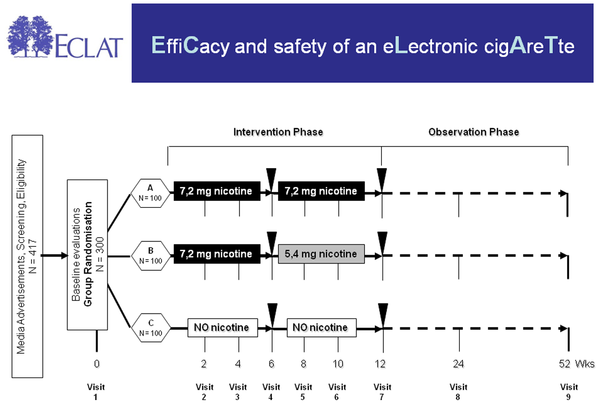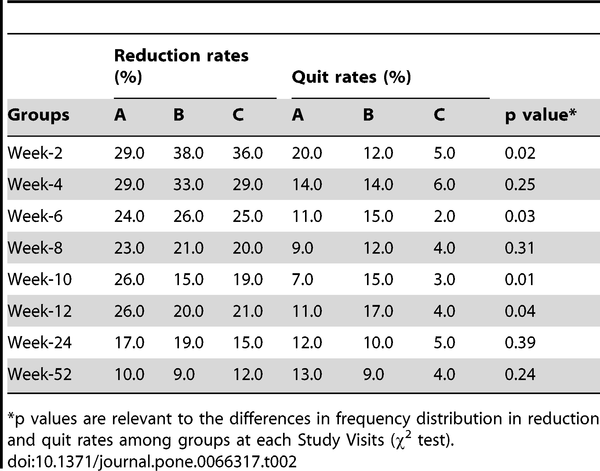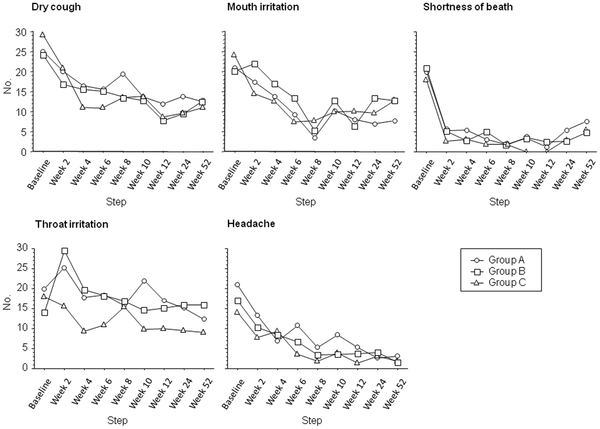The effectiveness of electronic cigarettes as a quit smoking aid just received a huge boost with a new Italian study published on the scientific journal PLOS ONE. In the first ever clincal trial on the effectiveness of tobacco reduction and smoking cessation rates using e-cigarettes, ECLAT found up to a 13 percent quit rate in participants over a 52 week period. What's amazing is that none of the 300 smokers who volunteered even wanted to quit using cigarettes. Even more amazing is the amount of nicotine used in the cartridges ranged from only 0 to 7.2mg/ml, far lower than most vapers typically start out with.

The Study Results
Participants were divided into three groups of 100 smokers each. Group A was supplied with electronic cigarettes and 7.2 mg/ml nicotine cartridges for 12 weeks. The 100 volunteers in group C were given 7.2 mg cartridges for the first 6 weeks and 5.4 mg for the remaining 6 weeks. Those in group C were essentially given a placebo of o mg/ml cartridges over the 12 week period. All participants were asked to follow up every two weeks for the first three months then again at six months and lastly at the end of the year long trial. Another oddity is that scientists used an outdated “Categoria” branded three-piece electronic cigarette, rather than the modern two piece variety.
On average, each participant smoked just over 20 cigarettes per day prior to the study. After 12 weeks, the amount of cigarettes each participant smoked on average was decreased by almost half. Remarkably, about 11% of the entire study field had stopped using tobacco cigarettes by week 12. This number included the 4% of those using the nicotine-free placebo cartridges who quit smoking altogether. At the end of the 52 week trail period, an astounding 13 percent of those from group A had completely stopped smoking tobacco cigarettes. Impressively, 73% of those who quit had also ceased using electronic cigarettes by week 52.

Electronic Cigarettes As NRT
Prior to the Italian ECLAT clinical trial, there was no scientific proof supporting claims that e-cigarettes were effective quit smoking devices. We only had personal testimonies and surveys of active and former users of electronic cigarettes. Electronic cigarettes or vaporizer pen devices are currently not allowed to be marketed as smoking cessation products, probably due to that lack of evidence and funding from pharmaceutical companies to protect their hold on the NRT industry. Monday's study results are a big step forward to changing all that.
Quit rates found in the ECLAT trial would arguably have been higher had study subjects been provided a higher quality electronic cigarette like an eGo with some good tobacco e-liquid. Either way we now have hard, scientific proof that e-cigarettes do indeed work. In comparison, traditional nicotine replacement therapy products have about the same success rate among smokers who intend to quit. It would be interesting to see a similar study to the ECLAT conducted using only participants ready and willing to quit smoking. The quit rate will presumably be much higher and probably compare to the typical survey response of around 30 percent.
What Can We Take From ECLAT?
There are several positives the vaping community can take from the ECLAT study. News over the past few months has been mainly about safety concerns and impending government regulations. It's been a while since anything was really discussed in detail regarding the effectiveness of electronic cigarettes as quit smoking devices. The fact that the study was funded by anti smoking group Lega Italiana AntiFumo shows there is outside interest in electronic cigarettes as smoking cessation devices.
Timing couldn't be more perfect either, as health ministers of both France and Italy recently recommended the banning of electronic cigarettes in public places. Not only did ECLAT look at smoking cessation rates among participants, but it analyzed the effects of electronic cigarettes on their health. It found no adverse changes in resting heart rate or blood pressure among active participants and none of them showed any signs of depression or weight gain. Furthermore, health issues associated with smoking were drastically improved over the course of the trial. Dry cough, mouth irritation, shortness of breath, throat irritation and headache were each reported in about half as many participants at the end of the study as they were at the onset.

The Italian ECLAT study is a huge step forward for the electronic cigarette community. It not only affirms our hypothesis that e-cigarettes are an effective alternative to analogs, but also can provide substantial health benefits over smoking. We still need even more studies like this one, as well as more in depth and long-term trails on lung functioning after switching to e-cigs.

